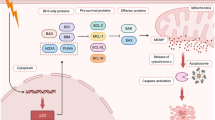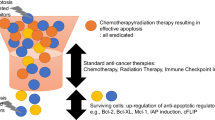Abstract
The ubiquitin ligase Cbl-b is a negative regulator of the PI3K/Akt pathway, the survival pathway implicated in chemotherapy resistance. However, it remains unclear whether Cbl-b can regulate chemosensitivity through modulating Akt activation. In this study, VP-16-induced RBL-2H3 cells apoptosis was accompanied by the activation of Akt and ERK. The PI3K inhibitor LY294002, not the ERK inhibitor PD98059, enhanced the apoptosis. In addition, down-regulation of Cbl-b was also detected. Over expression of Cbl-b significantly enhanced VP-16-induced cell apoptosis with inhibition of Akt activity, while a dominant negative (DN) RING Finger domain mutation completely abolished this enhancement. On the other hand, ERK activity was enhanced by Cbl-b, and the ERK inhibitor PD98059 reversed Cbl-b-enhanced apoptosis. The consistent results were also showed in the process of Ara-c treatment. These observations indicate that Cbl-b promotes RBL-2H3 apoptosis induced by VP-16 or Ara-c, probably through inhibition of Akt and activation of ERK.






Similar content being viewed by others
References
Arellano-Rodrigo E, López-Guillermo A, Bessell EM, Nomdedeu B, Montserrat E, Graus F (2003) Salvage treatment with etoposide (VP-16), ifosfamide and cytarabine (Ara-C) for patients with recurrent primary central nervous system lymphoma. Eur J Haematol 70(4):219–224
Becker K, Mueller JD, Schulmacher C, Ott K, Fink U, Busch R, Böttcher K, Siewert JR, Höfler H (2003) Histomorphology and grading of regression in gastric carcinoma treated with neoadjuvant chemotherapy. Cancer 98:1521–1530
Doepfner KT, Spertini O, Arcaro A (2007) Autocrine insulin-like growth factor-I signaling promotes growth and survival of human acute myeloid leukemia cells via the phosphoinositide 3-kinase/Akt pathway. Leukemia 21:1921–1930
Riedel RF, Porrello A, Pontzer E, Chenette EJ, Hsu DS, Balakumaran B, Potti A, Nevins J, Febbo PG (2008) A genomic approach to identify molecular pathways associated with chemotherapy resistance. Mol Cancer Ther 7(10):3141–3149
Rømer MU, Larsen L, Offenberg H, Brünner N, Lademann UA (2008) Plasminogen activator inhibitor 1 protects fibrosarcoma cells from etoposide-induced apoptosis through activation of the PI3K/Akt cell survival pathway. Neoplasia 10(10):1083–1091
Bortul R, Tazzari PL, Billi AM, Tabellini G, Mantovani I, Cappellini A, Grafone T, Martinelli G, Conte R, Martelli AM (2005) Deguelin, a PI3K/AKT inhibitor, enhances chemosensitivity of leukaemia cells with an active PI3K/AKT pathway. Br J Haematol 129(5):677–686
Opel D, Westhoff MA, Bender A, Braun V, Debatin KM, Fulda S (2008) Phosphatidylinositol 3-kinase inhibition broadly sensitizes glioblastoma cells to death receptor- and drug-induced apoptosis. Cancer Res 68(15):6271–6280
Sattler M, Pride YB, Quinnan LR, Verma S, Malouf NA, Husson H, Salgia R, Lipkowitz S, Griffin JD (2002) Differential expression and signaling of CBL and CBL-B in BCR/ABL transformed cells. Oncogene 21(9):1423–1433
Keane MM, Rivero-Lezcano OM, Mitchell JA, Robbins KC, Lipkowitz S (1995) Cloning and characterization of cbl-b: a SH3 binding protein with homology to the c-cbl proto-oncogene. Oncogene 10(12):2367–2377
Bachmaier K, Krawczyk C, Kozieradzki I, Kong YY, Sasaki T, Oliveira-dos-Santos A, Mariathasan S, Bouchard D, Wakeham A, Itie A, Le J, Ohashi PS, Sarosi I, Nishina H, Lipkowitz S, Penninger JM (2000) Negative regulation of lymphocyte activation and autoimmunity by the molecular adaptor Cbl-b. Nature 403(6766):211–216
Kitaura Y, Jang IK, Wang Y, Han YC, Inazu T, Cadera EJ et al (2007) Control of the B cell-intrinsic tolerance programs by ubiquitin ligases Cbl and Cbl-b. Immunity 26(5):567–578
Chiang YJ, Kole HK, Brown K, Naramura M, Fukuhara S, Hu RJ, Jang IK, Gutkind JS, Shevach E, Gu H (2000) Cbl-b regulates the CD28 dependence of T-cell activation. Nature 403(6766):216–220
Zhang R, Zhang N, Mueller DL (2008) Casitas B-lineage lymphoma b inhibits antigen recognition and slows cell cycle progression at late times during CD4+ T cell clonal expansion. J Immunol 181(8):5331–5339
Qu X, Sada K, Kyo S, Maeno K, Miah SM, Yamamura H (2008) Negative regulation of FcepsilonRI-mediated mast cell activation by a ubiquitin-protein ligase Cbl-b. Blood 103(5):1779–1786
Qu X, Liu Y, Ma Y, Zhang Y, Li Y, Hou K (2008) Up-regulation of the Cbl family of ubiquitin ligases is involved in ATRA and bufalin- induced cell adhesion but not cell differentiation. Biochem Biophys Res Commun 367(1):183–189
Caligiuri MA, Briesewitz R, Yu J, Wang L, Wei M, Arnoczky KJ, Marburger TB, Wen J, Perrotti D, Bloomfield CD, Whitman SP (2007) Novel c-CBL and CBL-b ubiquitin ligase mutations in human acute myeloid leukemia. Blood 110(3):1022–1024
Gustin SE, Thien CB, Langdon WY (2006) Cbl-b is a negative regulator of inflammatory cytokines produced by IgE-activated mast cells. J Immunol 177(9):5980–5989
Fang D, Wang HY, Fang N, Altman Y, Elly C, Liu YC (2001) Cbl-b, a RING-type E3 ubiquitin ligase, targets phosphatidylinositol 3-kinase for ubiquitination in T cells. J Biol Chem 276(7):4872–4878
Fang D, Liu YC (2001) Proteolysis-independent regulation of PI3K by Cbl-b-mediated ubiquitination in T cells. Nat Immunol 2(9):870–875
Xu J, Zhou JY, Tainsky MA, Wu GS (2007) Evidence that tumor necrosis factor-related apoptosis-inducing ligand induction by 5-Aza-2′-deoxycytidine sensitizes human breast cancer cells to adriamycin. Cancer Res 67(3):1203–1211
Qu X, Zhang Y, Li Y, Hu X, Xu Y, Xu L, Hou K, Sada K, Liu Y (2009) Ubiquitin ligase Cbl-b sensitizes leukemia and gastric cancer cells to anthracyclines by activating the mitochondrial pathway and modulating Akt and ERK survival signals. FEBS Lett 583(13):2255–2262
Lee ER, Ahn JY, Kang YJ, Kim BW, Cho SG (2006) Interplay between PI3K/AKT and MAPK signalling pathways in DNA damaging drug-induced apoptosis. Biochim Biophys Acta 1763(9):958–968
Zhang Y, Qu X, Hu X, Yang X, Hou K, Teng Y, Zhang J, Sada K, Liu Y (2009) Reversal of P-glycoprotein- mediated multi-drug resistance by the E3 ubiquitin ligase Cbl-b in human gastric adenocarcinoma cells. J Pathol 218(2):248–255
Morley N, Rapp A, Dittmar H, Salter L, Gould D, Greulich KO, Curnow A (2006) UVA-induced apoptosis studied by the new apo/necro-Comet-assay which distinguishes viable, apoptotic and necrotic cells. Mutagenesis 21(2):105–114
Lee ER, Kang YJ, Kim JH, Lee HT, Cho SG (2005) Modulation of apoptosis in HaCaT keratinocytes via differential regulation of ERK signaling pathway by flavonoids. J Biol Chem 280(36):31498–31507
Lee SH, Fujita N, Imai K, Tsuruo T (1995) Cysteine produced from lymph node stromal cells suppresses apoptosis of mouse malignant T-lymphoma cells. Biochem Biophys Res Commun 213(3):837–844
Acknowledgments
We thank Dr. Hirohei Yamamura and Dr. Kiyonao Sada for kindly providing the reagents. This article was supported by National Natural Science Foundation of China (No. 30770993, No. 30700807).
Author information
Authors and Affiliations
Corresponding author
Additional information
Xiujuan Qu and Yingchun Li contributed equally to this article.
Rights and permissions
About this article
Cite this article
Qu, X., Li, Y., Liu, J. et al. Cbl-b promotes chemotherapy-induced apoptosis in rat basophilic leukemia cells by suppressing PI3K/Akt activation and enhancing MEK/ERK activation. Mol Cell Biochem 340, 107–114 (2010). https://doi.org/10.1007/s11010-010-0407-8
Received:
Accepted:
Published:
Issue Date:
DOI: https://doi.org/10.1007/s11010-010-0407-8




